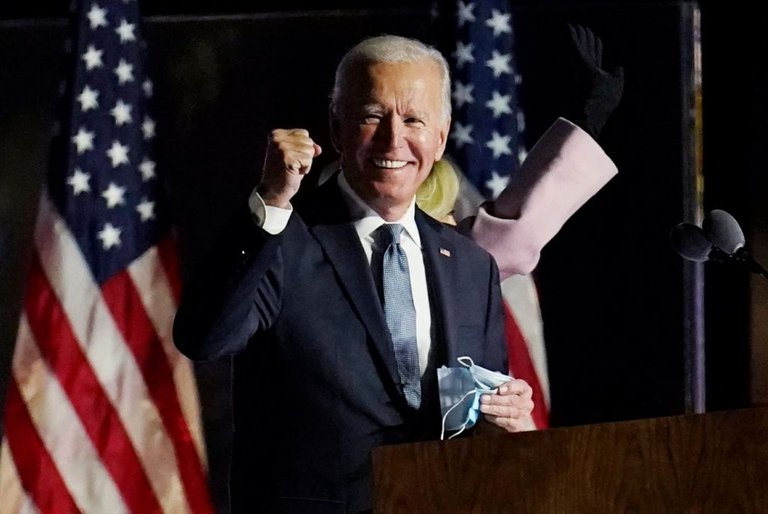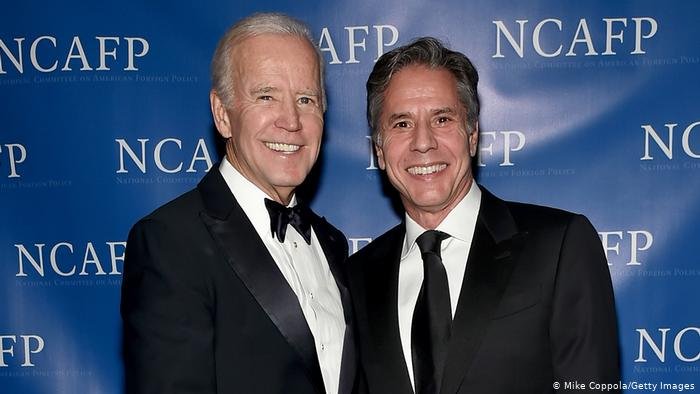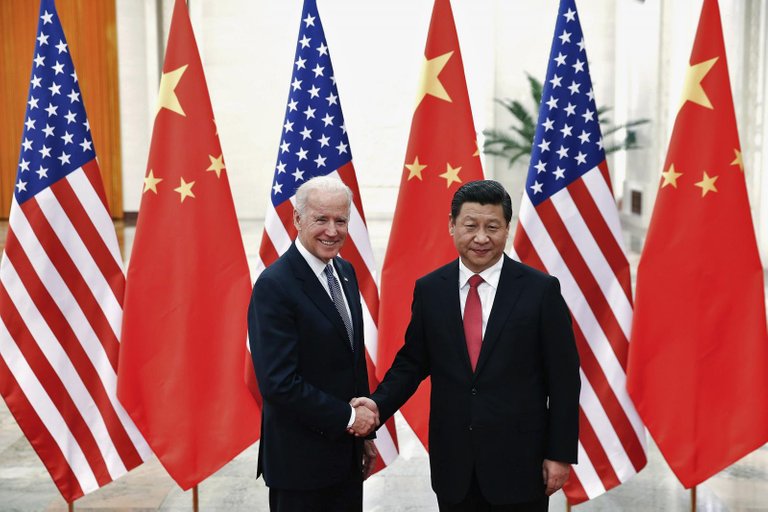
Biden wants to put the U.S. back on the map as a leading nation with moral authority, but also as a military superpower. The fact that he puts Antony Blinken forward as future minister of foreign affairs is no surprise in that respect. What foreign policy can we expect from Biden's government?
Joe Biden is busy preparing for his presidency. It starts in about two months, but it's not easy. Donald Trump still refuses to admit defeat. As a result, Emily Murphy, a faithful adherent of Trump and head of the General Services Administration, in turn refuses to do what is necessary to release the funds for a normal presidential transition and give the winner of the elections access to necessary policy information including classified documents.
Biden has already put forward several names for top positions that will determine his foreign policy to end his predecessor's "America first" policy, mockingly labeled by Biden as "America alone". Biden puts forward Antony Blinken as the new Minister of Foreign Affairs. Blinken was his national security advisor when Biden was vice president under Obama. Blinken is an experienced diplomat whose profile fully fits the lines Biden has already drawn in his campaign. More about that later.
Trump has come to be known as a fickle, impulsive and twittering unilateralist who has denounced one international agreement after another. He based his foreign policy on personal relationships with other leaders, and in his migration policy he reveiled himself as downright Islamophobic. Biden is expected to return to the more traditional role of the U.S. as a leading nation with a strong emphasis on alliances and international partnerships. But that does not mean that the U.S. will now emerge as a peaceful democratic nation that will give emerging superpowers such as China free rein.
Strengthening U.S. leadership
Biden wants to give shape to that leadership by restoring the moral authority of the U.S., but if necessary also with the necessary means of power. First the moral side of his plans. In Foreign Affairs, Biden published a long article in which he promises to put an immediate end to Trump's 'horrible' asylum policy such as the separation of children from their parents. He wants to reintroduce the right to asylum, albeit with securing the borders and a quota of 125,000 asylum seekers per year. He also says he will tackle the causes of migration with an aid package for countries such as El Salvador, Guatemala and Honduras to fight corruption, violence and poverty so that the pressure to flee is reduced. Say, an asylum policy according to European standards, including rhetoric versus deeds.

During the first year of his presidency, he plans to organize a 'global Summit for democracy' where he wants to bring together democracies "to strengthen our democratic institutions, honestly confront nations that are backsliding, and forge a common agenda".
To this end, he sees three priorities: the fight against corruption, the defence against authoritarianism and respect for human rights. He warns large social media companies to recognize their responsibility to protect democratic societies and freedom of expression. In a clear reference to Trump, he argues that freedom of expression cannot be an excuse to "spread malicious lies".
On his campaign website, Biden says he also wants to put an end to torture and promises more transparency in military operations. Meanwhile, we know from the Obama era that there can be a big gap between rhetoric and practice. Obama promised on the first day of his inauguration in 2009 to close the Guantanamo prison camp, where terror prisoners are held for years in degrading conditions without trial. He failed. In the year 2020 dozens of prisoners are still imprisoned.
On the military plan, he recognizes that the U.S. is sometimes too quick to take up arms, but at the same time he warns that he "will never hesitate to protect the American people, including when necessary, by using force". Biden doesn't seem to intend to lower the military machine. "The United States has the strongest military in the world and as president, I ensure it stays that way."
He does say he wants to put an end to the forever wars in which the U.S. has become embroiled. He wants to bring home most of the troops from Afghanistan and the Middle East. Biden also wants to stop supporting the Saudi Arabia-led war in Yemen. However, there must remain a focus on the 'fight against terror'. Spicy detail: the wars in Afghanistan and Iraq were named as such.
Biden is familiar with the foreign department. Before his position as vice-president he was for some time chairman of the Senate Committee for Foreign Affairs. He travelled the world and met dozens of leaders. It is precisely for this reason that he is not expected to achieve a major break with Obama's policy. During his election campaign, Biden largely appealed to political advisors of the Obama administration who were jointly responsible for the war in Libya, support for the Saudi war in Yemen, the stepping up of the military campaign in Afghanistan (the so-called 'surge') and an unprecedented deployment of armed drones in which many dozens of civilians were killed. Whistleblowers who revealed the dirty sides of foreign policy were prosecuted.
Antony Blinken
That brings us to the future Minister of Foreign Affairs, Antony Blinken. Blinken was an authoritative voice in the war politics under Obama. He supported the war in Libya and the arms deliveries to Syrian rebels. He defended Israel's bloody war against Gaza in 2014 as well as the Saudi war against Yemen with arms deliveries, intelligence sharing and the establishment of a coordination cell for military planning.

Biden himself supported the war against Iraq in 2003. He also lent his name to an opinion piece that advocated the division of Iraq into a Sunni, Shiite and Kurdish part. In his article in Foreign Affairs, Biden writes that he wants to continue his efforts for Israeli security without dirtying a word about the occupying and colonizing practices of that country or saying anything about Palestinian rights.
It is therefore not surprising that Biden, like Blinken, expressed his support for Israel's normalization agreements with the United Arab Emirates, Bahrain and Sudan, which the Palestinians, through President Mahmoud Abbas, regard as a "stab in the back". While Biden was critical of Turkey's actions in the Nagorno-Karabakh war and called President Erdogan an 'autocrat', Antony Blinken emphasizes that Turkey is a NATO member with whom more effective cooperation is needed and believes that the US should support Turkey's fight against the PKK (the Kurdish Workers' Party).
Blinken also symbolizes the kind of advisors who, after a political career, commercially capitalize on their experiences and the richly filled address book as consultants or in business. After his years with Obama, he co-founded WestExec Advisers, which negotiates contracts between private companies and the Pentagon, including the notorious Google contract to equip armed drones with artificial intelligence for targets. It was only through the protest of Google employees that the contract was finally terminated.
Change of direction
Nevertheless, it looks like there will be a profound change of direction with regard to Donald Trump's presidency. Biden has strongly criticized the denunciation of the nuclear agreement with Iran. He wants the U.S. to rejoin that agreement, which was in any case ratified in a resolution of the United Nations Security Council and is therefore part of international law. The sanctions against Iran will be lifted if Iran strictly abides by its provisions. But his future foreign minister do says he would still keep non-nuclear related sanctions in place as “a strong hedge against Iranian misbehavior in other areas.”
The biggest change is to be expected in the area of climate policy. Throughout his presidency, Trump has acted as a denier of this planetary threat and withdrew from the Paris Climate Accord. At the same time, he encouraged the extraction of fossil fuels. Biden promises that the U.S. will rejoin the climate agreement from day one of his presidency. He also announces 'massive investments' in clean energy to put the country on the road to a climate-neutral economy by 2050. He also wants to encourage other countries to do the same.
Remarkably, he does minimize the US share of CO2 emissions (the US emits "only" 15 percent of global emissions, according to Biden) and points the finger at China as the largest emitter by subsidizing coal exports and 'outsourcing' pollution to other countries. What he's not saying is that US per capita emissions are more than double those of China.
China
The policy towards China will not change fundamentally. As under Obama, as well as Trump, Asia will be at the heart of the US global strategy, both militarily and economically. Across party boundaries, the U.S. has the spectre of China as an economic superpower.
The United States does need to get tough with China. If China has its way, it will keep robbing the United States and American companies of their technology and intellectual property. It will also keep using subsidies to give its state-owned enterprises an unfair advantage—and a leg up on dominating the technologies and industries of the future. - Joe Biden, In Foreign Affairs.

According to Biden, the most effective way to meet China's challenge as a superpower is through a united front of U.S. allies and partners to deal with "China's abuse and human rights violations. Nevertheless, he opens the door for cooperation with Beijing on climate change, non-proliferation, and global health issues.
NATO
Trump played it hard in front of his NATO partners. He thought they should contribute a 'fair share' to the military alliance by increasing military spending. He called NATO 'outdated' and did not fail to brutally wipe out NATO leaders like the German Chancellor Angela Merkel. Biden wants to re-establish ties with NATO member states, but without creating the illusions that they can escape their 'fair share' in the effort.
I’m proud of the commitments the Obama-Biden administration negotiated to ensure that NATO members increase their defense spending (a move Trump now claims credit for). - Joe Biden, in Foreign Affairs
Biden emphasizes the importance of NATO as the "most effective political-military alliance in modern history". This also includes a piece of Cold War rhetoric:
To counter Russian aggression, we must keep the alliance’s military capabilities sharp while also expanding its capacity to take on nontraditional threats, such as weaponized corruption, disinformation, and cybertheft. We must impose real costs on Russia for its violations of international norms and stand with Russian civil society, which has bravely stood up time and again against President Vladimir Putin’s kleptocratic authoritarian system. - Joe Biden, in Foreign Affairs.
Nuclear weapons
A ray of hope is that Biden wants to reduce the role of nuclear weapons and extend the New START treaty on strategic (long-range) nuclear weapons, which would otherwise expire one month after he took office. The good news is that Biden is not in favor of nuclear 'first use' and, unlike Trump, sees nuclear weapons mainly in terms of deterrence.
Still, there is cause for scepticism when it comes to general nuclear disarmament. Unlike Obama - who ultimately did not live up to his promises on nuclear disarmament - he does not speak out about it for the time being and the nuclear weapons ban treaty does not even appear in his vocabulary. A lot of campaign money comes from the defence industry and many representatives of his party - together with Biden - are afraid to give a weak impression on a military level.
Conclusion
With Biden there will again be more room for a multilateral policy. Cooperation with like-minded nations seems to become a spearhead of this. He also seems to move away from the simplistic image of the enemy, although he is willing to do anything to prevent competing superpowers from outperforming the US.
He will take a little more account of international law. He will give international institutions - such as the World Health Organization - a higher priority, without completely undermining American power politics.
Biden is the emanation of mainstream American politics which will - as a matter of fact - put American interests first and will continue to strive to keep the US on the map as the most important military superpower. Human rights will gain in importance and he will be tough for authoritarian leaders, but he may be more likely to look the other way when human rights violations take place under the rule of friendly nations, as is part of American tradition. Biden is a centrist who takes the dominating role of the US for granted.